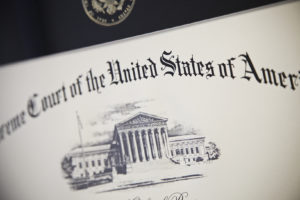
Who should decide what the Constitution’s provisions mean? In the 1803 landmark decision of Marbury v. Madison, the Supreme Court held that it would make the final decision. This concept is called Judicial Review and is a bedrock judicial principle. Rightly or wrongly, the Supreme Court is the ultimate arbiter of the Constitution. The logic is that the Constitution is the supreme law of the land, so the highest court, the Supreme Court, in the judicial branch, the “law interpreting” branch, should decide. But, some would ask should it be that way? Anyone who currently watches American politics knows that there are many people frustrated that nine individuals in Washington, D.C. make this decision outside the political process.
Now, the Constitution itself doesn’t expressly state which branch is to make the final call. Thus, there is an alternative theory to Judicial Review, which has floated around since the inception of the Union: “departmentalism.” This theory against judicial supremacy on Constitutional issues is fascinating to me as a lawyer.
“Departmentalism” is a concept that holds that each branch has the independent authority to interpret the Constitution where its own power is concerned. The idea is that if Congress or the President disagree with the Court’s interpretation of the Constitution, or each other, they can then ignore the decision. In theory, departmentalism’s ideology is that each branch will ultimately be forced to work collaboratively to decide the meaning of the Constitution. Under this theory, unlike Judicial Review, the Congress and the President are not bound by the decisions of the Courts on Constitutional issues.
While I like the concept in theory, I don’t believe it would ever work in practice even though it has had proponents, including Abraham Lincoln, throughout history, even today. But, to me, it ultimately does not work because the law needs consistency and finality, and this is especially true when it comes to Constitutional rights. One can imagine the chaos that would ensue if the branches constantly were able to fight over the meaning of the Constitution with impunity. The Executive could constantly jail individuals over free speech violations with the Supreme Court constantly freeing them. Or, Congress could pass law after law only to be ignored by the Courts. Thus, John Marshall was right in his decision to establish Judicial Review, as it is the best way to resolve Constitutional disputes and keep some semblance of order. I know that the system’s branches were built to be skeptical over one another and to balance each other out – and I believe there is always hope they will find common ground – but, in my opinion, on issues like Constitutional rights there needs to be a final decision maker and it should always rest with the judicial branch.

